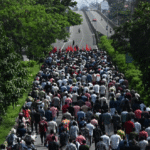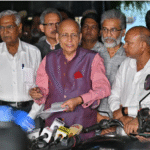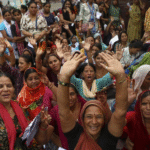The Crucial Election upcoming presidential election in Sri Lanka, scheduled for September 21, 2024, marks a critical juncture in the island nation’s political and economic trajectory. Following years of political upheaval, economic turmoil, and social unrest, this election represents an opportunity for Sri Lankans to reshape their nation’s leadership and navigate a path toward recovery. The political landscape has dramatically shifted since the ousting of former President Gotabaya Rajapaksa in 2022, who left office mid-term amid widespread protests over the country’s devastating economic crisis.
As Sri Lanka emerges from the shadows of this crisis, the presidential election has become a focal point for discussions about governance, accountability, and the future of the country. Several prominent candidates are vying for the presidency, each offering distinct visions for the nation’s future. This election has garnered significant international attention, as Sri Lanka’s geopolitical position and economic instability make the outcome of the election particularly consequential for regional and global powers alike.
In this article, Crucial Election we will explore the significance of the 2024 presidential election, examine how Sri Lanka’s political landscape has evolved since the ouster of Gotabaya Rajapaksa, and take a closer look at the leading candidates and their platforms.
The Significance of the September 2024 Election
The upcoming election holds particular importance due to its timing in the wake of a deep economic crisis that has left millions of Sri Lankans struggling with inflation, food shortages, and unemployment. The collapse of the Sri Lankan economy in 2022 was marked by skyrocketing debt, a shortage of foreign currency reserves, and a breakdown in essential services. This led to widespread protests, culminating in the ousting of then-President Gotabaya Rajapaksa, a member of the influential Rajapaksa family, which had dominated Sri Lankan politics for nearly two decades.
The election on Crucial Election September 21 offers the public an opportunity to elect a new leader who can steer the country through a period of rebuilding. Economic recovery, anti-corruption measures, and reforms to strengthen democratic institutions have emerged as central themes in the political discourse surrounding the election. For many Sri Lankans, the election represents a chance to break from the legacy of the Rajapaksa era and establish a new direction for the country.
Additionally, the international community is closely monitoring the election due to Sri Lanka’s strategic importance in the Indian Ocean region. The country’s proximity to key global shipping lanes and its growing economic ties with China, India, and other regional powers make the outcome of this election significant beyond Sri Lanka’s borders. Geopolitical considerations, including Sri Lanka’s alignment in regional politics and its role in China’s Belt and Road Initiative, are likely to be influenced by the election results.
Sri Lanka’s Political Landscape Post-Gotabaya Rajapaksa
The Crucial Election political landscape in Sri Lanka has undergone profound changes since the dramatic resignation of Gotabaya Rajapaksa in July 2022. Rajapaksa, a former military officer, rose to power in 2019, promising security and stability following the deadly Easter bombings that had shaken the country. However, his administration soon became synonymous with economic mismanagement and corruption, particularly in the handling of foreign debt and the country’s reliance on unsustainable infrastructure projects.
The 2022 Crucial Election economic crisis, exacerbated by the COVID-19 pandemic and global supply chain disruptions, saw inflation soar and foreign currency reserves plummet, leaving the country unable to pay for essential imports such as food, fuel, and medicine. This led to mass protests under the banner of the “Aragalaya” movement, which saw hundreds of thousands of Sri Lankans from diverse backgrounds take to the streets. The protests eventually forced Rajapaksa to flee the country, marking the first time in Sri Lanka’s history that a president was ousted by popular demand.
Since then, Crucial Election Sri Lanka has been governed by President Ranil Wickremesinghe, a veteran politician who was appointed by parliament following Rajapaksa’s resignation. Wickremesinghe, who has previously served as prime minister on multiple occasions, has focused on stabilizing the economy and securing international financial aid, including a bailout package from the International Monetary Fund (IMF). However, Wickremesinghe’s tenure has been controversial, with critics accusing him of being too closely aligned with the Rajapaksa family and failing to address the root causes of the crisis.
In the run-up to the 2024 election, the political environment remains highly charged. While Wickremesinghe has been praised for securing financial assistance and improving Sri Lanka’s fiscal situation, his government has faced criticism for austerity measures that have disproportionately impacted the poor and working-class citizens. Additionally, allegations of corruption and political patronage continue to cloud the country’s political institutions.
Leading Candidates in the Presidential Election
The Crucial Election 2024 presidential election features a diverse array of candidates, each representing different factions of Sri Lanka’s political spectrum. The leading contenders include current President Ranil Wickremesinghe, opposition leader Sajith Premadasa, and Anura Kumara Dissanayake, a progressive candidate known for his anti-corruption stance. Each candidate has positioned themselves as the solution to Sri Lanka’s ongoing challenges, offering distinct policy platforms and visions for the future.
Ranil Wickremesinghe: The Crucial Election Incumbent
Ranil Wickremesinghe is running for a full term in the 2024 election, having assumed the presidency following Rajapaksa’s resignation. As the incumbent, Wickremesinghe has focused his campaign on his record of stabilizing the economy and rebuilding international trust in Sri Lanka’s financial system. His government’s success in securing an IMF bailout and rescheduling foreign debt repayments has been a central talking point in his campaign, with Wickremesinghe positioning himself as the steady hand needed to guide Sri Lanka through its recovery.
Crucial Election However, Wickremesinghe’s presidency has been marred by public dissatisfaction over the austerity measures introduced as part of the IMF agreement. These measures, which include tax increases and cuts to public services, have been deeply unpopular with large segments of the population. Wickremesinghe has also faced criticism for his perceived closeness to the Rajapaksa family, leading some to question whether his administration represents a true break from the past.
Despite these challenges, Wickremesinghe remains a formidable candidate due to his extensive political experience and his ability to navigate Sri Lanka’s complex political landscape. His campaign has emphasized the need for continuity and stability, arguing that his leadership is essential to maintaining the progress made in economic recovery.
Sajith Premadasa: The Main Opposition Challenger
Sajith Premadasa, leader of the Samagi Jana Balawegaya (SJB) party and the son of former President Ranasinghe Premadasa, is widely regarded as the main challenger to Wickremesinghe in the 2024 election. Premadasa ran against Gotabaya Rajapaksa in the 2019 presidential election, where he lost but established himself as a major political figure.
Premadasa’s campaign has focused on addressing the economic hardships faced by ordinary Sri Lankans, promising to implement pro-poor policies, reduce inequality, and tackle corruption. He has been a vocal critic of the austerity measures imposed by the Wickremesinghe government, arguing that they disproportionately affect vulnerable populations. Premadasa has also positioned himself as an advocate for democracy and governance reforms, pledging to curtail the influence of political dynasties and increase transparency in government.
As the leader of the opposition, Crucial Election Premadasa has garnered significant support from those disillusioned with the current administration’s handling of the economic crisis. He has also sought to distance himself from the Rajapaksa family’s legacy, appealing to voters who want a fresh start for the country. His emphasis on social justice and economic reforms has resonated with many voters, particularly those from working-class backgrounds.
Anura Kumara Dissanayake: The Progressive Alternative
Anura Kumara Dissanayake, leader of the Janatha Vimukthi Peramuna (JVP), is running on a platform of anti-corruption, good governance, and social justice. Dissanayake, who has been an outspoken critic of both the Rajapaksa and Wickremesinghe administrations, has gained popularity among younger voters and progressives who are frustrated with the traditional political elite.
Dissanayake’s Crucial Election campaign has focused on tackling systemic corruption, which he views as one of the root causes of Sri Lanka’s economic collapse. He has called for comprehensive reforms to the country’s political and economic systems, including measures to increase accountability, reduce wasteful spending, and ensure that the benefits of economic growth are more equitably distributed.
As a Crucial Election leftist candidate, Dissanayake has also advocated for stronger labor protections, environmental sustainability, and investment in public services such as education and healthcare. His platform has attracted support from those who feel that the major political parties have failed to address the needs of ordinary Sri Lankans.
Crucial Election While Dissanayake’s JVP has historically been a minor party, his message of reform and anti-corruption has resonated in the wake of the economic crisis, positioning him as a viable alternative to the more established candidates. However, he faces challenges in building a broad enough coalition to win the presidency, as his base of support is concentrated among younger and more progressive voters.
Key Issues at Stake in the Election
Several Crucial Election key issues are at the forefront of the 2024 presidential election, as Sri Lankans grapple with the aftermath of the economic crisis and seek solutions to the country’s long-standing political and social challenges.
Economic Recovery and Austerity
The most Crucial Election pressing issue for many voters is the state of the economy. While the Wickremesinghe government has made progress in stabilizing Sri Lanka’s finances, the austerity measures required to secure international aid have been deeply unpopular. Candidates are divided on how to balance the need for fiscal discipline with the need to protect vulnerable populations from the worst effects of the crisis. Economic recovery plans, tax reforms, and social welfare policies are likely to be central themes in the election.
Corruption and Governance Reforms
Crucial Election Corruption has been a major issue in Sri Lankan politics for years, and the economic crisis has only amplified concerns about political accountability. All of the leading candidates have promised to tackle corruption, but they differ in their approaches. Wickremesinghe has emphasized institutional reforms and legal frameworks, while Premadasa and Dissanayake have focused on reducing the influence of political dynasties and increasing transparency.
Geopolitical Alignments
Crucial Election Sri Lanka’s geopolitical position makes the election outcome important not only for the island nation but also for its regional and global partners. The country’s relationships with China, India, and Western powers are likely to be shaped by the next administration’s foreign policy priorities. Candidates have different views on how to manage Sri Lanka’s economic and political relationships with these key players, with some advocating for a more balanced approach and others seeking closer ties with specific nations.
Conclusion
The Crucial Election 2024 presidential election in Sri Lanka is a pivotal moment in the country’s history, offering voters an opportunity to shape the future direction of their nation. ALSO READ:-2024 Union Minister Ravneet Bittu Sparks Controversy by Calling Rahul Gandhi “Number One Terrorist” at Bhagalpur Event





